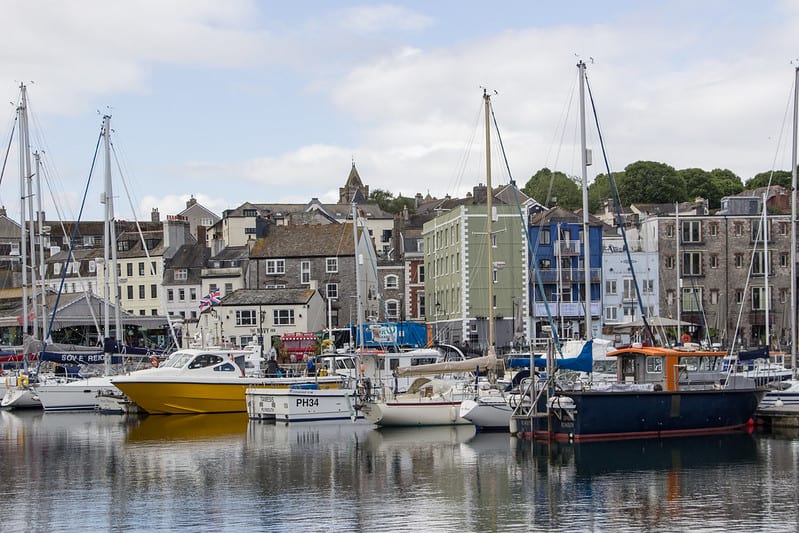Plymouth, a coastal city located in the southwest of England, is a popular tourist destination for its rich history, stunning natural beauty, and diverse range of activities. Whether you’re a history buff, outdoor enthusiast, or food lover, there’s something for everyone to enjoy in Plymouth.
History of Plymouth UK
Plymouth is a city located in the southwest of England, with a rich history dating back to the medieval period. Here is a brief timeline of some key events in Plymouth’s history:
- 1180: Plymouth is first recorded in historical records as a small fishing village, known as Sutton.
- 1497: Plymouth is visited by the Italian navigator John Cabot, who is believed to have anchored in the River Plym estuary.
- 1620: The Pilgrims, a group of English separatists seeking religious freedom, set sail from Plymouth on the Mayflower and establish the first permanent English settlement in New England. This event is remembered as the start of Plymouth’s association with the Americas.
- 1643: During the English Civil War, Plymouth is held by the Royalists and becomes an important stronghold for the King’s forces in the southwest of England.
- 17th and 18th century: Plymouth becomes an important port for trade, particularly with the Americas and the West Indies. The city’s economy thrives on the back of this trade, and it becomes a center for shipbuilding, engineering, and other maritime industries.
- 18th century: The Royal Navy establishes a base in Plymouth, making it an important center for naval defense. The naval base at Plymouth was crucial to the UK’s naval power throughout the 18th and 19th centuries.
- 19th century: Plymouth continues to grow as a port and industrial center, with shipbuilding and engineering industries at the forefront. The population of Plymouth also grows significantly during this time, as people move to the city for work.
- World War II: Plymouth is heavily bombed by the Germans, with over 3,700 homes destroyed and much of the city’s historic architecture damaged. The Plymouth Blitz was one of the most severe bombing campaigns in England during the war.
- 1950s and 1960s: Plymouth undergoes major redevelopment, with many new buildings and infrastructure projects. This period of modernization leads to the loss of much of the city’s historic architecture, but also brings new opportunities for growth and prosperity.
- 21st century: Plymouth continues to be an important economic and cultural center in the southwest of England, with a growing tourist industry and a diverse population. Today, Plymouth is a vibrant, modern city that celebrates its rich history and looks to the future with optimism.
Throughout its history, Plymouth has played an important role in England’s maritime and naval history, as well as its relationship with the Americas and the West Indies, and has undergone significant changes over time. The city has seen both prosperity and hardship, but has always remained resilient and determined to move forward.
Best Things to do in Plymouth UK
Here are some of the top things to do in this vibrant city:
Visit Plymouth Hoe: This iconic spot offers breathtaking views of the sea and Plymouth Sound. It’s a popular place for locals and tourists alike to relax, picnic, and soak up the sun. You can also take a stroll along the promenade, visit the Tinside Lido, an art deco sea water pool, and take a dip in the sea at the nearby beaches.
Explore the Barbican: This historic neighborhood is home to some of Plymouth’s most well-preserved Elizabethan and Jacobean architecture. Take a stroll through the winding streets and take in the sights of the Mayflower Steps, where the pilgrims set sail for America in 1620. You can also visit the Plymouth Gin Distillery, where you can sample the city’s famous gin and learn about its history.
Take a Boat Tour: Plymouth is a city built on water, and what better way to experience it than by taking a boat tour? You can take a ferry across Plymouth Sound to the nearby towns of Cawsand and Kingsand, or go on a fishing trip and try your hand at catching some of the local seafood.
Visit the National Marine Aquarium: This fascinating attraction is home to a wide range of marine life, including sharks, rays, and seahorses. You can also take part in interactive activities and learn more about the marine environment and conservation efforts.
Explore Plymouth’s Parks and Gardens: Plymouth has a variety of parks and gardens that are perfect for a relaxing stroll or picnic. Some of the top options include Central Park, Victoria Park, and the award-winning Saltram Park.
Visit the Royal Citadel: This 17th-century fortress offers stunning views of Plymouth Sound and the city. It’s also home to the Royal Artillery Museum, which tells the story of the Royal Artillery and its role in the history of Plymouth.
Enjoy the Local Cuisine: Plymouth is home to a diverse range of restaurants and cafes offering delicious local cuisine. Some of the top restaurants in Plymouth include The Boathouse, The Barbican Kitchen, and The River Cottage Canteen.
Best Restaurants in Plymouth
The Boathouse: Located on Plymouth Hoe, this seafood restaurant offers stunning views of the sea and delicious local seafood dishes.
The Olive Tree: This Mediterranean restaurant offers a variety of delicious dishes from the Mediterranean region with a focus on fresh seafood and local ingredients. -The Horn of Plenty: This elegant restaurant offers a fine dining experience with a menu that focuses on local, seasonal ingredients.
The Barbican Kitchen: This cozy restaurant serves up traditional British cuisine with a modern twist. -The River Cottage Canteen: This rustic restaurant offers a farm-to-table dining experience, serving locally sourced ingredients.
9 Interesting facts about Plymouth UK
- Plymouth is known for its naval history and is home to the Royal Navy’s main base on the south coast.
- The Plymouth Hoe, a large public park, is a popular spot for locals and visitors alike, offering views of the sea and the historic Plymouth Citadel fortress.
- Plymouth was heavily bombed during World War II, with over 3,700 homes destroyed, and many buildings have been rebuilt since.
- The Plymouth Gin Distillery, established in 1793, is the oldest working gin distillery in England, and offers tours and tastings.
- Plymouth is home to the National Marine Aquarium, the largest aquarium in the UK.
- Plymouth is home to the oldest working lighthouse in the country, Smeatons Tower, built in 1759.
- Plymouth is known for its maritime heritage and has a rich history in fishing and trade.
- Plymouth has a diverse cultural scene, with a number of museums, galleries, and theaters, including the Plymouth Theatre Royal, the oldest continuously operating theater in England.
- Plymouth is home to the University of Plymouth, which has a strong emphasis on marine and coastal research.
In conclusion, Plymouth is a city that offers a wide range of activities for visitors of all ages and interests. Whether you’re interested in history, the outdoors, or simply looking for a great meal, Plymouth has something to offer. Take the time to explore this beautiful city and discover its hidden gems.”

